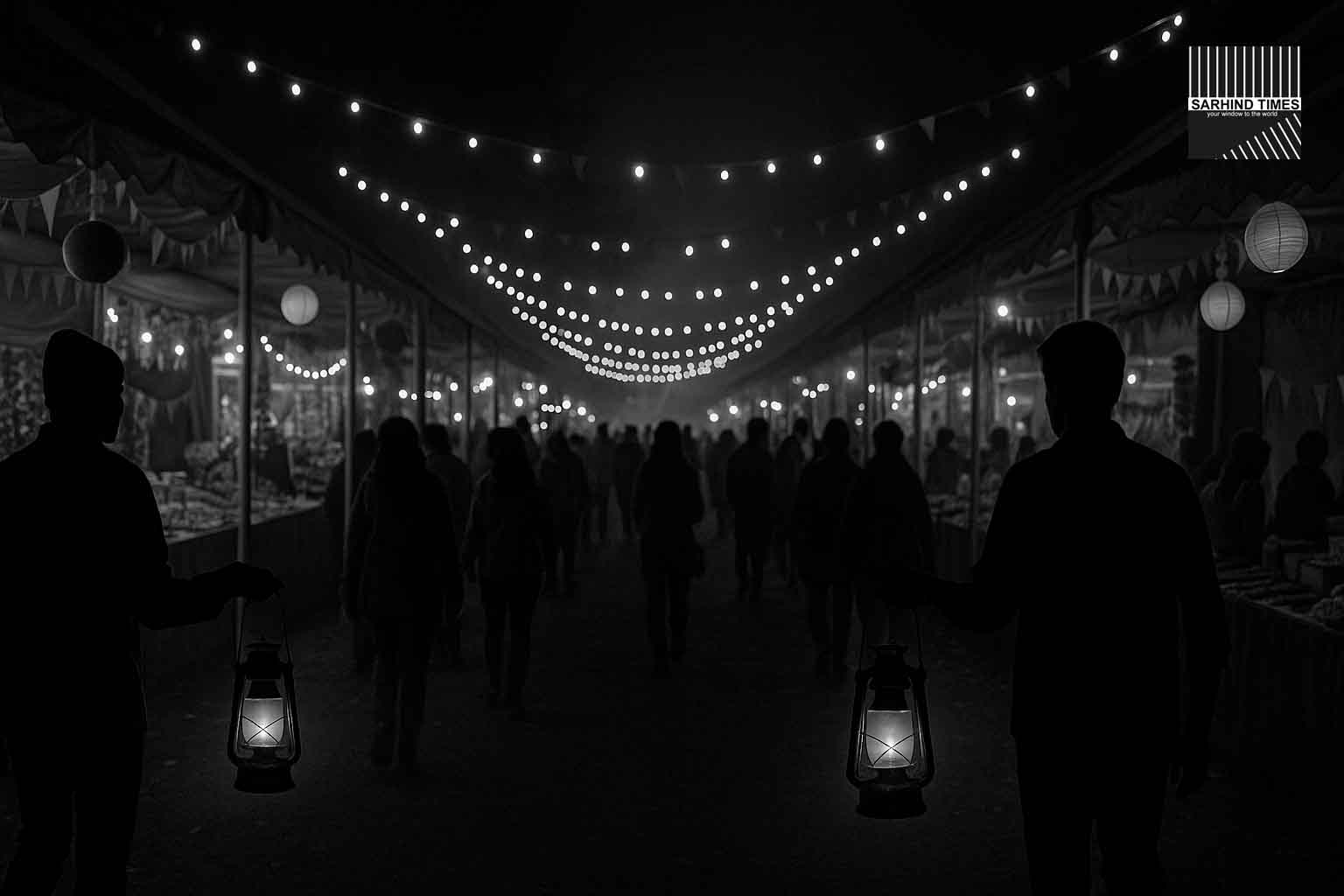Gurugram, October 12, 2025 — As Diwali draws near, Resident Welfare Associations (RWAs) across Gurugram are racing against time, refining plans for community melas, vendor rosters, security protocols and cleanup logistics. In localities like South City-2 and Sector 49, associations report coordination with police for patrols, deployment of parking stewards, and hygiene checks of food stalls. Multiple RWAs say these melas also serve as fundraising drives for winter welfare work. With overlapping event schedules, residents are being urged to arrive early or walk in where possible. The civic push reflects both the festive spirit and underlying challenges of scaling safe, orderly community celebrations in dense urban neighbourhoods.
Below is a detailed look at the planning, risks, best practices, civic interface and how RWAs can maximize safety, enjoyment and civic harmony.
Current Preparations & On-Ground Realities
What RWAs Are Doing Now
- In Vipul Greens, Sector 48, an RWA held a pre-Diwali celebration over a weekend, drawing over 1,500 residents, including food stalls, cultural performances, and games. They’ve also pushed a “green Diwali” message encouraging fewer fireworks.
- In South City-2 / Sector 49, the RWA is finalizing vendor onboarding, security rosters, parking arrangements, and working with waste contractors for prompt post-event cleanup. Local police are coordinating for patrols.
- Some RWAs are restricting or regulating firecracker use, setting designated zones and timings to limit smoke, noise and potential hazards.
- Societies are briefing their food stall operators on hygiene norms, ensuring safe handling, waste disposal, and compliance with civic food safety regulations.
- The events are often tied to charitable drives: distributing gifts, meals, or funding welfare projects in the off-season.
Civic & Legal Permissions
- RWAs must often secure permits from the civic body (MCG / municipal authorities) for hosting public fairs or melas, particularly in residential clusters. In previous years, MCG has mandated such permissions to enforce waste, fire safety, licensing norms.
- Some melas, like the Surajkund Diwali Mela, follow robust protocols: CCTV surveillance, multiple security layers, separate entry/exit gates, ambulance presence and parking plans.
Challenges & Constraints
- Overlapping Events & Scheduling Conflicts
- Multiple RWAs in adjacent sectors may schedule melas on the same day, causing demand spikes in roads, parking, crowd movement.
- Residents may need to choose which event to attend, or face congestion trying to hop between them.
- Limited Space & Infrastructure
- Many housing complexes lack large open grounds, forcing creative layouts, narrow stall aisles, tight movement corridors, or use of parking lots.
- Some societies struggle with temporary stages, power supply, lighting, and safety infrastructure.
- Security & Crowd Management Risks
- Managing entrants, preventing overcrowding, ensuring safe exits, controlling unruly behavior, and avoiding accidents (slips, fall, burns) are non-trivial.
- Past incidents have shown that security guards may overstep, leading to disputes. (E.g. a society mela where security guards allegedly assaulted a teenager trying to enter.
- Waste & Hygiene Burden
- Large melas generate significant solid waste, food waste, packaging, disposable utensils, etc. Timely cleanup is vital to avoid mess, rodents, foul smell.
- Ensuring food hygiene at multiple stalls is complex — many small vendors may lack experience or oversight.
- Fire & Electrical Safety
- Improper wiring, overloaded connections, use of open flames (candles, diyas, fireworks) elevate risk of short circuits or fire hazards.
- Emergency access must be maintained; event layout must be such that fire tenders can approach as needed.
- Parking, Traffic & Access
- Popular melas often exceed local parking capacity and spill over into residential lanes, causing congestion.
- Managing inflow and outflow of vehicles, drop-off zones, and pedestrian crossings is critical.
- Liability & Accountability
- If accidents occur, legal liability may lie with the RWA or event organizers. Hence, proper insurance, permissions, and adherence to norms matter.
- Unauthorized events (without permits) risk intervention or shutdown by municipal authorities.
Best Practice Framework for RWAs
To host melas that are joyous, safe and compliant, RWAs can follow a structured checklist and approach:
Pre-Event Planning
- Stakeholder Coordination
Engage police, traffic, fire department, municipal waste services, electrical utilities, local health inspectors, and ambulances in early planning. - Permissions and Licenses
Apply well in advance for civic / municipal event license, fire safety permit, food vendor permissions, sound/noise permit (if applicable), and outdoor event licenses. - Venue Assessment & Layout
Map entry/exit points, emergency paths, stall layout, walkways, electrical routes, stage / performance area. Leave buffer zones and safe distances. - Vendor Vetting & Contracts
Select vendors vetted for hygiene, electrical safety, load-bearing capacity. Include clauses for cleanliness, waste disposal, compliance. - Security Plans & Crowd Management
Deploy screening, bag checks, cordons. Place security guards, marshals, volunteer guides. Use signage, ropes or barricades to manage flows. - Electrical / Lighting & Fire Safety
Use certified wiring, avoid ad-hoc cabling. Install fire extinguishers, first aid kits, ensure a water supply. Assign an electrician on standby. - Parking & Transport Logistics
Designate parking zones, drop-off points, shuttle services if needed. Ensure pedestrian pathways and management of vehicle flow. - Waste Management Strategy
Arrange bins, segregation, swift removal, cleaning teams. Pre-arrange liaison with waste contractors. - Emergency Preparedness
Allocate first-aid points, tie-ups with local hospitals, ambulance availability, evacuation plans, trained volunteers. - Communication & Publicity
Share event details, routes, parking, timing with residents, send notices, leaflets, social media updates. Emphasize safety, timing, parking instructions.
During the Event
- Crowd Monitoring
Marshals and CCTV to measure density, avoid overcrowding, manage queueing at stalls, entry bottlenecks. - On-the-Fly Adjustments
Be ready to open alternate exit routes, throttle stall access, redirect traffic if congestion arises. - Security & Incident Response
Immediately address disputes, medical cases, lost children, fire small incidents. Keep liaison with police. - Hygiene / Visual Cleanliness
Ensure dustbins are emptied timely, aisles are swept, spills cleaned, and wash areas functioning. - Inclusive Access
Provide seating or shade for elderly, ensure ramp / walkways, water stations, assistance points.
Post-Event Wrap-up
- Cleanup & Restoration
Engage contractors to clear garbage, dismantle structures, restore grounds to pre-event state. - Incident Debrief & Feedback
Review what worked, what didn’t, record incident logs, get participant feedback, note improvements. - Accounts & Transparency
If fundraising was involved, publish receipts, donor lists, expense breakdown. Build trust. - Recognition & Appreciation
Thank volunteers, police, vendors, staff; perhaps small tokens or certificates.
Civic Interface & Institutional Roles
RWAs act as the on-the-ground executors, but success depends heavily on coordination with civic institutions.
Municipal Corporation / MCG Responsibilities
- Granting timely event permissions, ensuring infrastructure support (electricity, water, waste), fire department clearances, oversight.
- Enforcing event norms, penalizing unlicensed events, ensuring post-event cleanup compliance.
Police & Traffic Departments
- Traffic diversions, parking regulation, crowd control, security presence, emergency access lanes, coordination of ingress/egress paths.
Fire & Safety Services
- Event inspection, safety audits, ensuring compliance of fire safety measures (extinguishers, escape routes, electrical circuits).
Health Department / Food Safety Authorities
- Vendor licensing, random hygiene inspections, food quality checks, enforcing public health norms.
Utility & Infrastructure Agencies
- Ensuring power supply, backup, load management, water supply, drainage, sanitation, lighting, street cleaning.
If all levels sync, events can flow smoothly; if coordination breaks down, mishaps or friction points emerge.
Risks Worth Watching & Mitigation
- Unauthorized entry / security clashes — maintain tight gates, entry management, and protocols for outsiders.
- Disputes over space / crowding — enforce caps on stall size, maintain aisle widths, monitor density.
- Fire / electrical accidents — ensure professional wiring, safe loads, standby personnel.
- Medical emergencies — have first-aid, ambulance access, clear signage.
- Litter and garbage overflow — frequent cleanup, waste removal points, visible bins.
- Traffic spillover / congestion — manage parking well, coordinate with traffic police, set drop-off zones away from main roads.
- Post-event property damage / ground wear — supervise layout and dismantling responsibly.
Case Spotlight: Surajkund Mela’s Protocols
The Surajkund Diwali Mela (Oct 2–7) provides a model for safe large-scale fairs:
- Over 500 stalls, thematic zones, visitor routing.
- Multiple entry/exit gates, CCTV surveillance, control room, ambulance presence.
- Vendor zones demarcated, security screening protocols, defined parking arrangements.
RWAs in local sectors can adapt those practices at smaller scales.
Conclusion
As Gurugram’s RWAs commit to Diwali melas — combining community joy with civic responsibility — their success depends not only on enthusiasm but on disciplined planning, institutional coordination, safety rigor, and post-event accountability. Done right, these fairs can strengthen bonds, uplift local vendors, and enrich festive spirit. Done poorly, they risk disorder, waste, safety hazards, and reputational blowback.
For residents, a little patience, following guidelines, arriving early, and supporting volunteer measures can help make their community festival memorable — in all the right ways.
#Gurugram #RWAs #Diwali #Community #Civic




+ There are no comments
Add yours